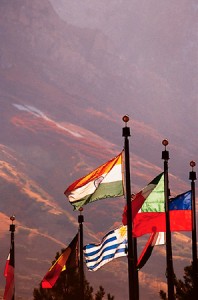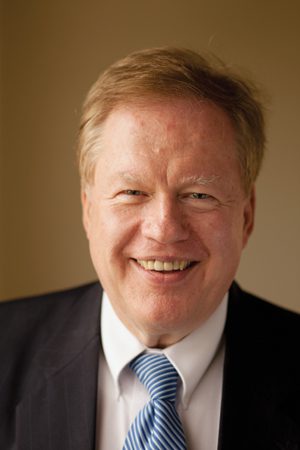
Supporting learning and research abroad and hosting dignitaries from around the world are two ways BYU is making the world its campus.
By Sandra Rogers, ‘74
BYU students and faculty are making connections with people around the world.
In 1995, a year after President Rex E. Lee, ’60, signed an affiliation agreement with the University of Jordan, Professor Rosanne Schwartz, ’78, took 12 nursing students to Jordan for a semester of course work and clinical experience. During their stay the students took nursing classes, studied community health and leadership, and worked with Jordanian nursing students at local hospitals. While the Jordanian faculty and health care leaders were impressed by the BYU students’ academic work, they were even more impressed with their values. They were surprised to find that Americans had loyalty to family and adhered to a high moral code.
Since these beginnings the friendship between BYU and the University of Jordan has continued to develop. BYU faculty in engineering, business, anthropology, and nursing have worked with colleagues at the University of Jordan on research projects and publications. The two universities have jointly sponsored academic conferences, including a forum in 2000 on Arab-American relations. These ties have made it possible for BYU faculty to mingle with professors from nearly every country in the Middle East.
This friendship is just one example of BYU‘s efforts to reach across national and cultural borders to create academic opportunities for students, form partnerships with faculty, and forge friendships between BYU and people, universities, and countries around the world. Under the leadership of President Merrill J. Bateman, BYU‘s international objectives have not only grown but have been recognized as an integral part of the university’s mission.
At the foundation of BYU‘s international strategy is a desire to support students and faculty in building bridges of understanding with other countries and peoples; collaborating internationally, our scholars can contribute to research and dialogue that promotes solutions to world problems and enriches the quality of life of all people. Another motivation is to increase BYU‘s international recognition and promote awareness of who we are as a people. Just as we want to understand others better, we hope our efforts will help others more accurately understand BYU and the Church of Jesus Christ, its sponsoring organization.
Global Learning
During the summer of 2001, Latter-day Saint BYU students traveled to the Ukraine to participate with university students from other faiths in a weeklong workshop on religious freedom. When President Bateman, who was in Europe for various assignments, visited the workshop, the Ukrainian students told him how impressed they were with the BYU students’ knowledge and language ability, as well as the “light” in their eyes. One young woman said that because of that light she could tell that the BYU students “knew God.” These same BYU students impressed the Ukrainian faculty with their academic awareness and knowledge of political science.
As part of the education of the mind and spirit at BYU, we hope to continue to develop students whose intellects and hearts are open to the issues of an international society. Part of doing this is creating international learning environments through which students gain a greater appreciation for other countries, cultures, and peoples. International students, who make up more than 5 percent of BYU‘s student body, help create such an environment on campus. They bring a wealth of cultural diversity and knowledge and enrich the academic and social experience of all students at BYU.
Also, students in many majors now have the opportunity for an experience abroad. The International Study Programs Office of the David M. Kennedy Center for International Studies prepares international experiences for students in internships, academic courses, research experiences, and service-learning programs. More than 1,800 BYU students had a university-directed educational experience outside the United States in 1999. Students have long enjoyed the opportunity to study in London, Vienna, Paris, and Madrid. The Jerusalem Center for Near Eastern Studies has housed thousands of BYU students studying history, language, and religion in the Holy Land.
Students have also received an international education through participating in field studies programs. For example, the Anthropology Department takes students to Guatemala, where they have contributed ethnographic insights into Guatemalan culture. Students have also participated in key archaeological finds from the Mayan era in Guatemala.
Some of the students’ interest in such programs stems from other international experiences. More than 50 percent of BYU students have lived outside the United States as missionaries for the Church of Jesus Christ. These students bring to campus their love of the countries, cultures, and peoples with whom they have lived and served. It is no wonder that language acquisition is one of BYU‘s greatest strengths. During fall 2001 nearly 7,000 students were in language courses. This background makes it possible for BYU students to learn from cultures all over the world. (For more on language atBYU, see “Speaking in Tongues,” p. 46.)
Building Bridges
Alongside these opportunities for students are increasing scholarly collaborations among faculty in every college at BYU and their colleagues at institutions around the world who are pursuing answers to the same questions. For example, BYU faculty, in conjunction with the College of Biology and Agriculture’s Benson Institute, are involved in agricultural research to improve nutrition in Latin America and Africa. The McKay School of Education has worked with Beijing Normal University to improve teaching in China. Audiology faculty are doing research and improving hearing-screening skills with their Vietnamese counterparts. Such faculty collaboration includes partnerships and exchanges with scholars from other countries. Many of these scholars visit our campus and come away impressed with the setting, the students, and the spirit of the university.
BYU now has affiliation agreements with more than 25 universities internationally. Through these agreements BYU has supported conferences, workshops, faculty exchanges, and student activities that share academic knowledge, spiritual values, and friendship.
Another way BYU has built bridges of knowledge is by hosting both a symposium on law and religious liberty and a forum on family issues each year. Prominent jurists, government leaders, family scientists, academics, and religious leaders from every continent come to campus for in-depth discussions of the most pressing issues in religious freedom and family life. They leave with a clearer picture of the university and its sponsoring Church.
Extending the BYU Experience
BYU‘s international efforts include sharing the learning, culture, and spirit of BYU with people around the world. One aspect of this is BYU‘s independent study courses, which are taken by students over the Internet and by mail in more than 20 countries. The university is also developing an English-language acquisition program that could have far-reaching effects internationally. BYUTV offers university programming, such as devotionals, forums, symposia, cultural productions, and some sports events, to viewers around the globe. Members of the Church as well as those of other faiths from several countries have written to express their appreciation for the quality and values of the programming.
Student performing groups also extend BYU‘s influence. For more than 30 years, they have promoted friendship and goodwill as they entertain audiences around the world. These student musicians, dancers, and singers share the talents they are developing at the university and are wonderful ambassadors of BYU‘s mission and values. Because of their influence, for example, BYU is one of the most well-known American universities in China.
BYU also shares its distinctive culture by hosting ambassadors and other high-level dignitaries. Since 1995 more than 50 ambassadors have visited campus. Earlier this year the Spanish ambassador was on campus to sign an agreement regarding the creation of a Spanish resource center at BYU. The Chinese ambassador recently spoke to a standing-room-only crowd. Future guests include ambassadors from the Ukraine, Denmark, Mongolia, the European Union, Japan, and Morocco. The ambassador program not only familiarizes visiting leaders with BYU and the Church, but the lectures these guests give on campus enable students and faculty to engage in discourse on today’s pressing international questions. Many of these ambassadors have expressed interest in having their children attend BYU or in creating connections between BYU and academic institutions in their countries.
These efforts help the BYU community better understand people of different cultures and, in turn, be more accurately understood by them. In a truly global and diverse era in society and the Church,BYU‘s efforts to establish bridges for international education, scholarship, outreach, and friendship are forging ties that make students and faculty “more fit for the Kingdom” (“More Holiness Give Me,” Hymns [Salt Lake City: The Church of Jesus Christ of Latter-day Saints, 1985], no. 131) and help create an environment where we can all truly esteem each other as ourselves (see D&C 38:24–25).
Sandra Rogers is BYU‘s vice president for international affairs.









